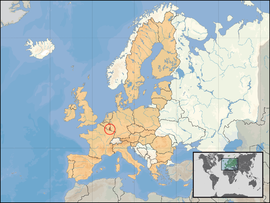
Radio Luxembourg (French)
Encyclopedia

Longwave
In radio, longwave refers to parts of radio spectrum with relatively long wavelengths. The term is a historic one dating from the early 20th century, when the radio spectrum was considered to consist of long, medium and short wavelengths...
commercial radio station that began broadcasting from the Grand Duchy of Luxembourg in 1933 as a daytime and evening service in the French language from Monday to Saturday and until 12 Noon on Sundays.
The station closed down at the outbreak of World War II
World War II
World War II, or the Second World War , was a global conflict lasting from 1939 to 1945, involving most of the world's nations—including all of the great powers—eventually forming two opposing military alliances: the Allies and the Axis...
in 1939, but it resumed service after the War.
The French service has called itself RTL for many years. It still broadcasts on 234 kHz long wave, but nowadays also on a network of FM transmitters throughout France, as well as on the internet, cable and satellite. http://www.rtl.fr/
Unlike the British government's treatment of the Luxembourg English service, which was never allowed to have a landline from London, the French service has long had its main studios in Paris, with a landline from there to the transmitter. Consequently it appears to the listener to be simply a big French national radio station, and the Luxembourg connection is played down.
Whereas Luxembourg's English service was always centred on light entertainment and popular music, RTL in French is a mixed station: about 50% of its output is speech-based, with a strong focus on news and current affairs and a large team of respected journalists.
Radio Luxembourg's two main national competitors are Europe 1
Europe 1
Europe 1, formerly known as Europe n° 1, is a privately owned radio network created in 1955. It is one of the leading French radio broadcasters and heard throughout France...
(another out-of-country commercial station, broadcasting from Saarland, again with Paris studios) and the state-owned France Inter. All three stations have very high-powered transmitters occupying long-wave frequencies that date back many decades.
Since 1991 there has also been a completely separate RTL service in French, called Bel-RTL, intended for the French-speaking part of Belgium and with studios in Brussels. This is not an out-of-country station but is licensed (along with many competing commercial stations) by the Belgian Government, with a network of FM transmitters covering Brussels and Wallonia, and no particular connection with the Grand Duchy of Luxembourg other than its ownership by the RTL parent company. http://www.rtlgroup.com/AboutUs_History_1990.htm

